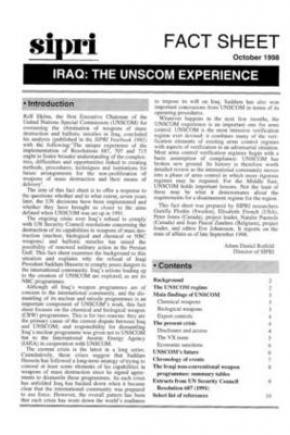Iraq: The UNSCOM Experience

Rolf Ekéus, the first Executive Chairman of the United Nations Special Commission (UNSCOM) for overseeing the elimination of weapons of mass destruction and ballistic missiles in Iraq, concluded his analysis (published in the SIPRI Yearbook 1992) with the following: 'The unique experience of the implementation of Resolutions 687, 707 and 715 ought to foster broader understanding of the complexities, difficulties and opportunities linked to creating methods, procedures, techniques and institutions for future arrangements for the non-proliferation of weapons of mass destruction and their means of delivery'.
The aim of this fact sheet is to offer a response to the questions whether and to what extent, seven years later, the UN decisions have been implemented and whether they have brought us closer to the aims defined when UNSCOM was set up in 1991.
The ongoing crisis over Iraq's refusal to comply with UN Security Council resolutions concerning the destruction of its capabilities in weapons of mass destruction (nuclear, biological and chemical or NBC weapons) and ballistic missiles has raised the possibility of renewed military action in the Persian Gulf. This fact sheet examines the background to this situation and explains why the refusal of Iraqi President Saddam Hussein to comply poses dangers to the international community. Iraq's actions leading up to the creation of UNSCOM are explored, as are its NBC programmes.
Although all Iraq's weapon programmes are of concern to the international community, and the dismantling of its nuclear and missile programmes is an important component of UNSCOM's work, this fact sheet focuses on the chemical and biological weapon (CBW) programmes. This is for two reasons: they are the primary cause of the current dispute between Iraq and UNSCOM; and responsibility for dismantling Iraq's nuclear programme was given not to UNSCOM but to the International Atomic Energy Agency (IAEA) in cooperation with UNSCOM.
The current crisis is the latest in a long series. Cumulatively, these crises suggest that Saddam Hussein has followed a long-term strategy of trying to conceal at least some elements of his capabilities in weapons of mass destruction since he signed agreements to dismantle these programmes. As each crisis has unfolded Iraq has backed down when it became clear that the international community was prepared to use force. However, the overall pattern has been that each crisis has worn down the world's readiness to impose its will on Iraq. Saddam has also won important concessions from UNSCOM in terms of its operating procedures.
Whatever happens in the next few months, the UNSCOM experience is an important one for arms control. UNSCOM is the most intrusive verification regime ever devised: it combines many of the verification elements of existing arms control regimes with aspects of verification in an adversarial situation. Most arms control verification regimes begin with a basic assumption of compliance: UNSCOM has broken new ground. Its history is therefore worth detailed review as the international community moves into a phase of arms control in which more rigorous regimes may be required. For the Middle East, UNSCOM holds important lessons. Not the least of these may be what it demonstrates about the requirements for a disarmament regime for the region.
- Background
- The UNSCOM regime
- Main findings of UNSCOM
- The present crisis
- UNSCOM's future
- Chronology of events
- The Iraqi non-conventional weapon programmes: Summary tables
- Extracts from UN Security Council Resolution 687 (1991)
- Select list of references
